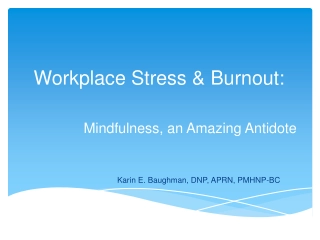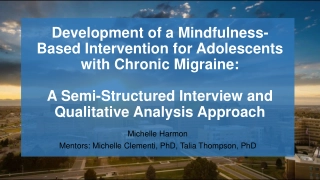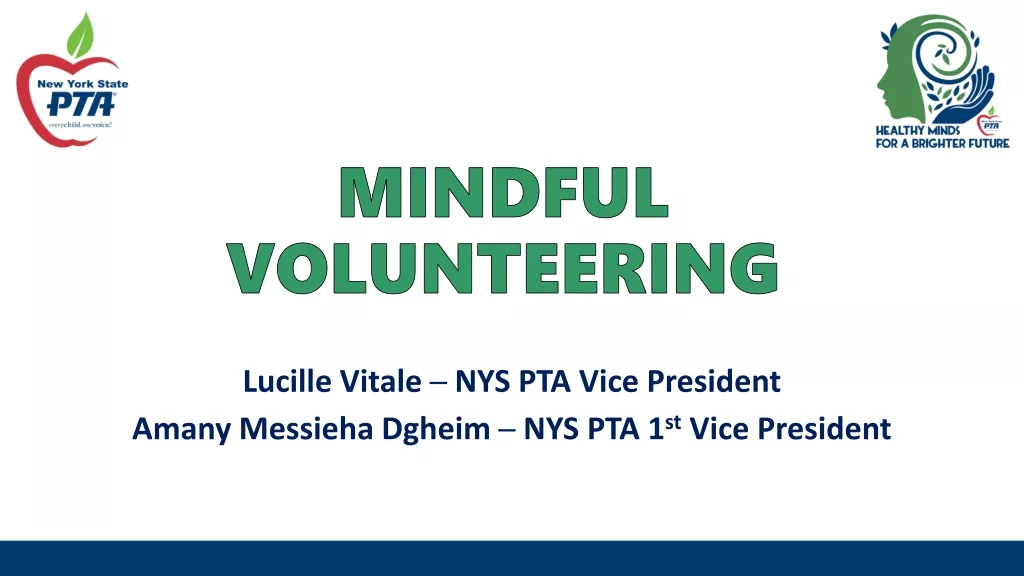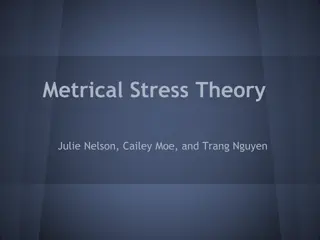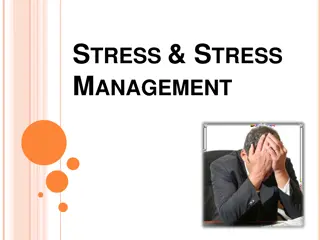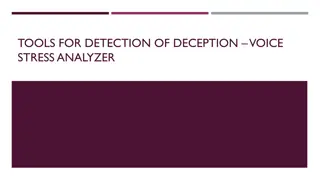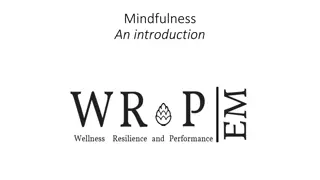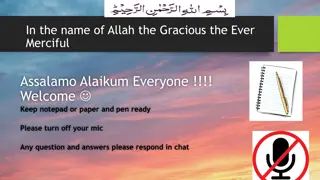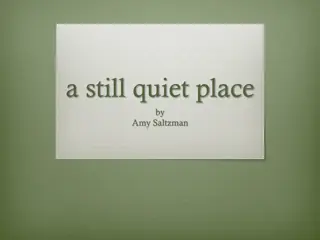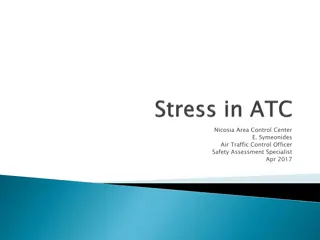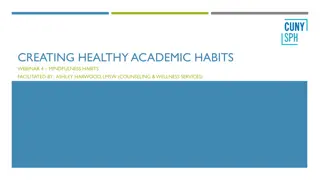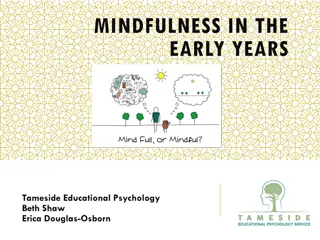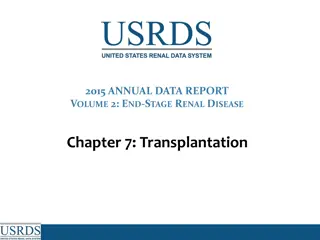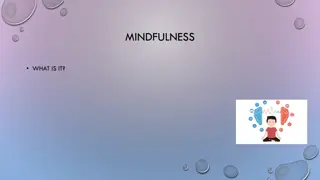Impact of Mindfulness-Based Stress Reduction for MS Patients
Exploring the short and long-term effects of Mindfulness-Based Stress Reduction (MBSR) for individuals with multiple sclerosis (MS), this study highlights the potential benefits of stress management techniques in reducing anxiety, depression, lesion risk, and brain volume loss. The MBSR intervention, compared to an education control group, aims to enhance present-moment awareness, acceptance, and self-compassion. The research design includes recruitment criteria, intervention details, and outcome evaluation over a 12-month follow-up period to assess feasibility, efficacy, and durability of MBSR in improving perceived stress and mental health among MS patients.
Download Presentation

Please find below an Image/Link to download the presentation.
The content on the website is provided AS IS for your information and personal use only. It may not be sold, licensed, or shared on other websites without obtaining consent from the author. Download presentation by click this link. If you encounter any issues during the download, it is possible that the publisher has removed the file from their server.
E N D
Presentation Transcript
SHORT- AND LONG-TERM IMPACT OF MINDFULNESS-BASED STRESS REDUCTION FOR PEOPLE WITH MS Angela Senders, ND, MCR Douglas Hanes, PhD Kimberly Carson, MPH Dennis Bourdette, MD Lynn Marshall, ScD Lynne Shinto, ND, MPH
The authors have no personal or financial conflicts of interest to declare.
STRESS AND MS Anxiety: Lifetime prevalence 36% (vs. 29%) Depression: Lifetime prevalence 36-54% (vs. 16%) Exacerbation: Pooled ES of 0.53 (95CI: 0.40 0.65) Stress-management may: Decrease risk of Gd+ lesions Increase odds of remaining lesion free [OR: 2.77 (1.17-6.55)] Decrease brain volume loss (-0.11% vs. -0.43%, p=0.01) Minden et al. 2013, Mohr et al. 2004, Mohr et al. 2012
MINDFULNESS Capacity to notice Present moment Acceptance Non-judgment Self-compassion Attempt to change how one relates to experiences, rather than reduce their frequency
AIMS Single-blind, parallel, RCT Assess feasibility and trial processes Assess preliminary efficacy of MBSR vs. Education Control Evaluate durability over a 12-month follow up 80% power 5 points in perceived stress 10 points in SF-36 mental health
RECRUITMENT INCLUSION EXCLUSION Adults >= 18 yo MBSR or CBT within 5 yrs Confirmed MS, McDonald Criteria Current meditation/yoga practice EDSS <= 8 Relapse within 30 days of baseline Stable on DMT/Anxiolytics MMSE <= 26 Mild to moderate stress Severe depression, BDI > 30
INTERVENTION: MBSR 8 weekly classes Retreat during week 6 Mindfulness: meditation, movement, eating, interacting Kimberly Carson, MPH, C-IAYT, E-RYT Techniques: Gentle yoga, breath work, body scan 45 minutes of daily homework strongly encouraged
CONTROL: MS EDUCATION 8 weekly classes Retreat during week 6 Medications & Supplements Fatigue Pain Gait and Balance MS and the Mind Know your Rights Financial Planning Carol Choutka NMSS Program Implementation & Engagement
OUTCOME MEASURES Primary: Feasibility Recruitment Adherence Accessibility Secondary Perceived Stress Scale Mental health quality of life (SF-36) PROMIS Anxiety, Depression, Fatigue, Pain Interference Resilience (Connor-Davidson) PASAT 3
ANALYSIS PLAN Primary Feasibility Secondary Intention-to-treat ANCOVA (baseline covariate) to compare mean change in outcomes between groups from baseline to 8 weeks and baseline to 12 weeks. Paired T-tests to assess within-group change over time
Assessed for eligibility (n=180) Excluded (n=113) Declined participation (n=27) Did not meet inclusion criteria (n=51) Scheduling conflicts (n=27) No shows to baseline visit (n=8) Randomized (n=67) Dropped out before first class (n=5) MBSR (n=33) MS Education (n=29) Discontinued/Lost to Follow Up (n=2) Lack of interest (n=1) No reason provided (n=1) Discontinued/Lost to Follow Up (n=1) Lack of interest (n=1) Completed 8-week Assessment (n=59) Completed 12-mos Assessment (n=55) Analyzed (n=62)
BASELINE DEMOGRAPHIC DATA MBSR (n=33) % Education (n=29) % Age (years sd) Female Education HS Diploma College Grad Race/Ethnicity Hispanic or Latino White 53 11 85 53 12 69 52 48 31 69 10 97 4 97 EDSS (mean sd) 4.48 1.76 4.72 2.14 Credibility (mean se) 21.63 0.72 18.62 1.02
BASELINE CLINICAL STATUS Type of MS Medication use 100 100 80 80 60 60 40 40 20 20 0 0 MBSR (n=33) Education (n=29) MBSR (n=33) Education (n=27) RR SP PP DMT Psychotropic
RESULTS: FEASIBILITY Adherence 85% of participants attended 6/8 (75%) of classes Only 28% practiced at least 70% of eligible days Accessibility 6-hour retreat was too long 1 AE with isometric muscle contractions Yoga requires modification
RESULTS: CLINICAL EFFICACY Between-group comparisons: Improvements for MBSR were of greater magnitude, not statistically significant Within-group comparisons: Significant and meaningful change in BOTH groups, sustained for a year Perceived Stress Mental Health QOL Anxiety Depression Fatigue Resilience
PERCEIVED STRESS SCALE (0-40) MBSR 20 Education 18 Mean PSS Score 16 14 12 10 8 0 4 8 12 16 20 24 28 32 36 40 44 48 52 56 60 Time in Weeks
SF-36 EMOTIONAL WELLBEING (0-100) MBSR Education 85 80 Mean SF-36 Sub-score 75 70 65 60 55 0 4 8 12 16 20 24 28 32 36 40 44 48 52 56 60 Time in Weeks
DISCUSSION Few studies control for time, attention, and social interaction Social functioning may mediate the relationship between stress and depression This is the first time I ve been in a room with someone else with MS Kirschner et al., 2012; Vargus and Arnett, 2010
LIMITATIONS Participants unmasked Homogenous study sample Lack of a passive control group -> spontaneous recovery? Regression to the mean?
IMPLICATIONS People with MS are at increased risk of stress-related emotional disorders. affording patients psychological and social support as part of their treatment package is likely to ensure the greatest possible mitigation of the potential financial, social, and psychosocial burdens associated with MS. Stress-management is like exercise: varied activities that are pleasurable Rieckmann et al., 2012: p464.
ACKNOWLEDGEMENTS NIH NCCIH K23AT008211 Our Participants Lynne Shinto, ND, MPH Dennis Bourdette, MD Barry Oken, MD, PhD Heather Zwickey, PhD Kimberly Carson, MPH Carol Choutka OHSU MS Center and Providers Sara Pavao Jan Taylor
REFERENCES Kirchner T, Lara S. Stress and depression symptoms in patients with multiple sclerosis: the mediating role of the loss of social functioning: The role of social functioning in multiple sclerosis. Acta Neurol Scand. 2011 Jun;123(6):407 13. Minden SL, Feinstein A, Kalb RC, Miller D, Mohr DC, Patten SB, et al. Evidence-based guideline: Assessment and management of psychiatric disorders in individuals with MS: Report of the Guideline Development Subcommittee of the American Academy of Neurology. Neurology. 2013 Dec 27;82(2):174 81. Mohr DC, Hart SL, Julian L, Cox D, Pelletier D. Association between stressful life events and exacerbation in multiple sclerosis: a meta-analysis. BMJ. 2004 Mar 27;328(7442):731. Mohr DC, Lovera J, Brown T, Cohen B, Neylan T, Henry R, et al. A randomized trial of stress management for the prevention of new brain lesions in MS. Neurology. 2012 Jul 31;79(5):412 9. Rieckmann P, Boyko A, Centonze D, Coles A, Elovaara I, Havrdov E, et al. Future MS care: a consensus statement of the MS in the 21st Century Steering Group. J Neurol. 2012 Aug 31;260(2):462 9. Vargas GA, Arnett PA. Positive everyday experiences interact with social support to predict depression in multiple sclerosis. J Int Neuropsychol Soc. 2010 Nov;16(06):1039 46.



